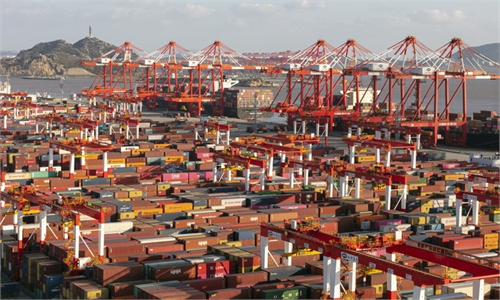
A worker makes high-efficiency photovoltaic solar modules for export at an enterprise in Huai'an, East China's Jiangsu Province on November 15. The city is striving to integrate local photovoltaic industry resources and build a 100 billion yuan ($15.67 billion) level new-energy industrial cluster amid the country's efforts to achieve its carbon emissions peak and carbon neutrality goals by 2050. Photo: cnsphoto
China on Wednesday set a new mark for anti-US bullying, with its first ever white paper on export controls drawing a clear line between the country's approach to safeguarding its interests that is aligned with standard international practice and the US' indulgence in imposing export sanctions, as Washington seeks to crack down on Chinese tech firms.The policy document puts China, an advocate of a joint push for the healthy development of international export controls, in stark contrast with the US, which is seeking to hook its allies into small circles for export controls, experts said, adding that the policy paper is also a dose of reassurance for foreign investors on China's continuous opening-up.
The white paper was released by the State Council Information Office, and consists of four chapters that give a systematic account of its basic position on export controls, improvements that are underway to the legal and regulatory system for export controls, the modernization of the export control mechanism, and the push for international exchanges and partnerships.
As a permanent member of the UN Security Council, and the world's largest goods trader and manufacturer, China has always been committed to the principle of safeguarding national security, world peace and regional security by steadily improving export control governance, read the white paper.
It termed export controls as a standard international practice that involves prohibitive or restrictive measures on exports of dual-use items and military products, among other goods, and technologies and services related to safeguarding national security and national interests.
The country will take concrete actions to participate in global coordination of export controls and work together with the rest of the world in giving a strong boost to world peace and development, the white paper said.
Urgent fix to global regime
The Wednesday document serves as a much-needed fix to global export control practices, as China outlined its legal and regulatory improvements that will pave the way for its alignment with standard international practice, thereby overcoming challenges posed by a US-led selection of countries undermining global practice, Chinese officials and experts stressed.
Currently, international export controls are facing a variety of challenges, including the abuse of export control measures and unreasonable discriminatory restrictions. Some countries, in particular, have generalized the concept of national security, fabricated excuses, directed state power to intervene in normal trade flow and market transactions, and frequently used export controls as a tool to attack and bully other countries, officials from China's Ministry of Commerce (MOFCOM) said in a question-and-answer session following the release of the white paper.
Such moves have eroded the legitimate interests of fellow developing countries in the peaceful uses of controlled items, disrupted international industrial chains and supply chains, and jeopardized the sustainable development of many countries, MOFCOM officials said.
"The second challenge is the attempts of countries to form small circles and turn their back on true multilateralism, or even apply double standards on non-proliferation, which are in essence unilateralist practices carried out under the pretext of multilateralism," the officials said.
"This is the right approach that China championed in response to the chaotic situation in international governance of export controls and anti-globalization sentiment, and aims to let the torch of multilateralism light the path ahead for mankind," said Guo Xiaobing, a research fellow with the China Institutes of Contemporary International Relations.
As export control systems and mechanisms are established and improved in more countries, they are expected to promote and guarantee in-depth development of globalization, rather than block that trend, Guo said.
Export controls will reduce security risks, the expert said, noting that effective export controls can reduce security threats, prevent the risk of conflicts, ease tensions and create a stable and predictable international trade environment.
The white paper made special mention of the release of the Export Control Law in October 2020, the culmination of a wide range of administrative regulations, departmental rules and regulatory documents that have been introduced over the past few decades to set detailed provisions on matters related to export controls.
The law sets a basic institutional framework and unified rules for export controls, including a control list, temporary controls, a restricted name list and supervision, the white paper said, emphasizing that the law "raises China's export control legislation to a higher level."
In addition to the Export Control Law, the country has in place a foreign trade law, national security law, data security law and nuclear safety law, among other laws, which provide a strong legal basis for export control measures.
As the white paper put it, the country has now instituted a well organized basic legal system on export controls with well-coordinated laws, among other regulations and rules, "providing a solid legal foundation for developing a modern export control system with Chinese characteristics."
Chinese authorities will speed up the improvement of supporting regulations for the Export Control Law and accelerate the formulation of a unified export control list, according to MOFCOM.
Song Wei, a research fellow at the Chinese Academy of International Trade and Economic Cooperation under MOFCOM, told the Global Times on Wednesday that the laws and regulations related to the export control regime are becoming more complete, enabling China to gain a stronger foothold and more policy options in defending its national interests and security, which is also in line with China's responsibility as a world power.
"The law and regulation framework is the very basis of China's export control regime, which is in stark contrast to the US, a country that often wields its stick to crack down on other countries and their enterprises," Song noted.
She believed that in future implementation of the Export Control Law, relevant departments will roll out specific rules, further improving the framework.
Stark contrast
The white paper conspicuously separates the China-endorsed multilateralism and the US-led decoupling mentality with a discriminatory approach to export controls, observers said, lambasting the US-led crackdown on Chinese tech firms that stops at nothing to impose various export sanctions.
In recent years, the US has led a reversing trend in the field of international export controls. Instead of promoting economic and trade development, it promotes decoupling and engages in small circles of technological blockades, Guo noted.
Since the US added Chinese tech giant Huawei to its entity list in 2019, an increasing number of Chinese businesses and entities have been slapped with export controls and sanctions based on various accusations that China has slammed as groundless.
In a fresh move, China's foreign ministry earlier in December harshly criticized more reported US sanctions on Chinese chipmaking giant Semiconductor Manufacturing International Corp and vowed to defend Chinese companies' legitimate rights and interests.
In order to maintain its technological hegemony and competitive advantage, the US has expanded and strengthened export controls in high-tech fields, according to Li Hengyang, an associate research fellow with the Institute of American Studies at the Chinese Academy of Social Sciences (CASS).
The US government is attempting to isolate and block the supply chain through export controls, and prevent China from acquiring and using US products or technologies in the high-tech field, Li said, emphasizing that the US only cares about bringing difficulties to Chinese companies' operations through these control measures.
"Those US moves lack factual basis and are full of lies. They are total political manipulation and bullying tactics."
In comparison, China's move toward putting global export control governance on track is seen as a reassurance to the business community of a fair and more sustainable business environment, market watchers said.
Export controls will help maintain and enhance the reputation of enterprises and reduce barriers to foreign trade, Guo said.
"For companies, improving export control construction will add to internal procedures and costs, but these little burdens will be compensated with more convenience in trade and more positive international reputations," he continued, describing such efforts as securing long-term development and bringing a large return with only a small investment.

